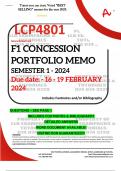Tutors you can trust. Voted “BEST
SELLING” memos for the year 2023.
LCP4801
International Law
F1 CONCESSION
PORTFOLIO MEMO
SEMESTER 1 - 2024
Due date: - 16 - 19 FEBRUARY
2024
Includes Footnotes and/or Bibliography
QUESTIONS – SEE PAGE 1
INCLUDES FOOTNOTES & BIBLIOGRAPHY
DETAILED ANSWERS
WORD DOCUMENT AVAILABLE!
Disclaimer DISTINCTION GUARANTEED!!!
Extreme care has been used by our Tutors to draft this document, however the contents are provided “as is” without any representations
or warranties, express or implied. This document is to be used for comparison, research and reference purposes ONLY. No part of this
document may be reproduced, resold or transmitted in any form or by any means without prior written permission from the Author. –
LLB EXAMPACKS & TUTORIALS.
PAST PAPERS & MEMOS, ASSIGNMENT MEMOS, NOTES, SUMMARIES & TUITONS.
Cell: 062 810 8624 Email:
Fax: 086 096 5452 www.llbexampacksandtutorials.co.za
,LCP4801 FI CONCESSION FEBRUARY 2024
Assume that you work for the Department of International Relations and Co-
operation in South Africa. In 2024 there will be national elections and it is likely that
a new Minister of International Relations and Co-operation may be appointed. To
prepare the new Minister for their role and responsibilities in this important task,
you have been asked to draft an essay, substantiated by appropriate authority,
properly structured with an introduction; sub-headings and a conclusion, and that
is fully referenced by way of footnotes, to give the new incumbent insights into
their new role. Please limit the essay to no more than 16 pages, including
references. The essay must include a critical discussion of the following non-
exhaustive list of theoretical and practical issues:
1. The full meaning, content, impact and consequences of sovereignty;
2. South Africa’s position as a member of the “third world” and the arguments
in favour of respecting the sovereignty of South Africa and other states in a
similar situation;
3. The sources of international law;
4. The ability of the state to negotiate and ratify international treaties and how
this has been adapted for South Africa in the 1996 Constitution, including
the transformation of treaties into South African law;
5. The discretion that states have when ratifying treaties concerning whether
they agree to be bound by a treaty in its entirety or not;
6. Enforcement of international law. {100}
, Introduction
In terms of the Constitution of the Republic of South Africa of 1996, the President is ultimately
responsible for the foreign policy and international relations of South Africa. As such, it is the
President’s prerogative to appoint heads of mission, receive foreign heads of mission, conduct
state-to-state relations, and negotiate and sign all international agreements. International
agreements that are not of a technical, administrative or executive nature will only bind the country
after being approved by Parliament, which also approves the country’s ratification of or accession
to multilateral agreements. All international agreements must be tabled in Parliament for
information purposes.
However, the Minister of International Relations and Cooperation is entrusted with the formulation,
promotion, execution and daily conduct of South Africa’s foreign policy. In order to prepare the
new Minister for his/her role and responsibilities in this important task, I will discuss the following
with the intention to enlighten the new Minister on his/her role on his/her new responsibilities as
the Minister of International Relations and Cooperation.
1. The full meaning, content, impact and consequences of sovereignty.
State sovereignty means that the state may decide what to allow within its borders without
interference from other states. This was a particularly strong principle which persists as one of
the pivotal rules of international law although concerns for the protection of human rights may
have relaxed its strict meaning. Secondly (and perhaps more obviously) these entities have to
interact with one another on a daily basis – hence the raison d’être of the constantly evolving
international law rules. 1
Article 2(1) of the UN Charter provides: ‘The Organisation is based on the principle of the
sovereign equality of all its members.’ The ‘sovereign’ part of equality in this first principle under
article 2 takes us back to the history of the modern state, which has been explained above. 2
1 Strydom H international Law (2nd edition Oxford University Press 2020) page 134.
2 Strydom H international Law (2nd edition Oxford University Press 2020) page 134.




